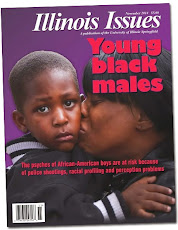Two months ago, Democratic and Republican legislators stood next to Gov. Pat Quinn and agreed to start over on drafting a bill that would — for the first time in Illinois — limit the amount of money individuals and political organizations could donate to political campaigns. They vowed to present a new version during this month's legislative veto session. But the bill introduced by House Speaker Michael Madigan on Wednesday has been called a step backward by reform advocates.
Madigan's bill, Senate Bill 1466 (amendment 2), was still “under review” at the end of Wednesday’s legislative session, the first of six days scheduled over the next two weeks. SB 1466 still would limit donations to $5,000 from individuals, $10,000 from corporations, labor organizations and associations, and $50,000 from political action committees or other candidates. The limits also would apply to the election cycle rather than the calendar year, one change from last spring’s House Bill 7 (background here).
Reform advocates oppose Madigan’s version primarily for one reason: It would continue to allow unlimited financial support to candidates from statewide political parties and legislative caucuses.
“Not having a limit on the party caucus and the legislative leaders is not a consistent with meaningful reform,” said Peter Bensinger, co-chairman of the Change Illinois reform coalition. “It restricts everybody else but the leaders. We don’t think it’s going to restore public trust.”
Kent Redfield, a campaign finance expert with the University of Illinois at Springfield and the Illinois Campaign for Political Reform, echoed statements by Republican Rep. Ed Sullivan of Mundelein. He said Madigan’s version goes backward from last spring’s version in HB 7. According to Redfield, Madigan last year gave $1.6 million to the Democratic Party of Illinois, of which he also chairs. Under HB 7, the speaker would only have been able to give $90,000 to the Democratic Party of Illinois. The current bill would allow unlimited transfers. “We’re going back to the way it is,” Redfield said.
Bensinger added that it also could discourage individuals from challenging existing officeholders (his testimony is here). While all candidates would be able to collect limited amounts from individuals and organizations, newcomers would be at a disadvantage, compared with incumbents who had unlimited financial support from party leaders. “The balance of power becomes more entrenched in Springfield in the hands of the few rather than getting the control of the electorate in the districts,” he said.
Bensinger added that it also could discourage individuals from challenging existing officeholders (his testimony is here). While all candidates would be able to collect limited amounts from individuals and organizations, newcomers would be at a disadvantage, compared with incumbents who had unlimited financial support from party leaders. “The balance of power becomes more entrenched in Springfield in the hands of the few rather than getting the control of the electorate in the districts,” he said.
When testifying to a House committee Wednesday morning, Madigan said the intent was to “limit money flowing into the campaign system and reduce influence of outside groups and lobbyists.” And he defended the role of political parties by saying they’re not a special interest promoting a cause.
“The entire basis for existence for a political party is to promote candidates running under its banner. Their fate in an election is inherently intertwined with that of their candidate. Thus, there is really no meaningful distinction between a party spending on behalf of its candidates and expenditures made by the candidates themselves.”
The speaker added that his version “would place Illinois squarely in the mainstream of campaign finance reform” because 25 states allow political parties to make unlimited contributions to their candidates in general elections. And two of those states have some limits during primary elections. “One half of America provides unlimited contributions in the general election,” he said. See a National Conference of State Legislatures chart here.
The bill is currently on hold, with some technical errors that could create a loophole for reporting requirements, said Cynthia Canary, executive director of the Illinois Campaign for Political Reform.
The bill also is in limbo because it lacks Republican support, which is necessary to satisfy the three-fifths supermajority of votes needed during the veto session (because, as currently written, part of the bill would take effect in 2010, while other parts would take effect in 2011).
“I don’t think you’ll see a lot of support,” House Minority Leader Tom Cross said after a lengthy meeting behind closed doors with the governor and all four legislative leaders. “I think people see it for what it is: It’s not a bill that regulates us. You’ve got a lot of power invested in the leaders of the four caucuses, including ours. And we just don’t see any movement in that area. That’s disappointing.”
Fewer votes will be needed once the legislature’s spring session starts in January.
Rather than accept the bill now and work on limiting contributions from party leaders later, Bensinger said: “That’s the question: Will someone ever come back to the piece later? I don’t think Illinois should take halfway step measures. This is like a house without a roof.”
Like HB 7, Madigan’s version still would:
Like HB 7, Madigan’s version still would:
- Require candidates to report contributions and expenditures four times a year, as opposed to the current twice a year. Donations of $1,000 or more would have to be reported within two business days throughout the entire year.
- Allow the Illinois State Board of Elections to conduct random audits, to investigate alleged violations of contribution limits or reporting requirements and to waive fees if the mistakes were found to be inadvertent.
- Form a task force to study and make recommendations on a public financing system for judicial elections.





No comments:
Post a Comment